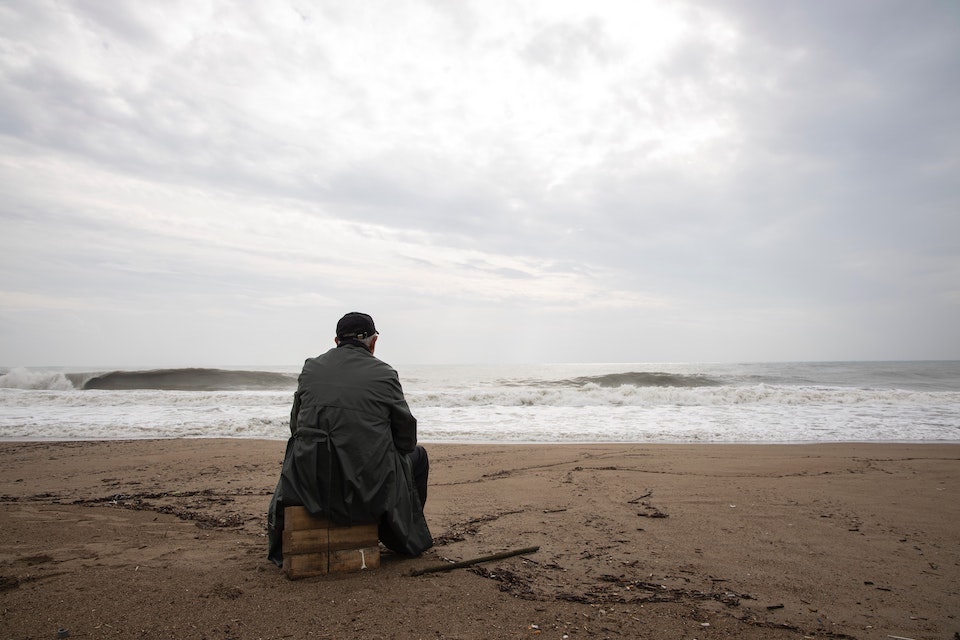
For many years, Simone Filiaci has experienced depression and loneliness. It can be difficult to understand how different factors can contribute to this debilitating condition. Simone explains how seeking help changed his life.
Mental Health awareness week runs from 9 to 15 May and explores the theme of loneliness, its impact on our mental health and how we can all play a part in reducing loneliness within our communities. Loneliness affects millions of people in the UK every year and can be a key cause of poor mental health.
Teenage angst
I’ve been suffering from depression since I was 13 or 14. Depression interferes with the reward system of the brain, so nothing feels good and everything is an exhausting waste of energy. Why should I bother with anything, if I still feel the same barren void?
At the time I didn’t know what was happening to me, and my parents didn’t have the tools to deal with it, so for years I thought it was normal teenage angst. I eventually realised that not everyone thinks of killing themselves several times a week, and that what I was experiencing wasn’t so common. For many years, I crawled on alone, until finally starting treatment in my late twenties.
Painfully aware
The long years before starting treatment were possibly the loneliest of my life. Not in the sense that I was physically alone - I did hang out with friends and family, when I could muster the strength to pretend to be a functioning human being. However, I was always painfully aware of my isolation, and how I had to put in effort to engage in social interactions that seemed effortless for others. My feeling of alienation was enormous; I could see others merrily socialising, yet all I wanted to do was crawl back to my dark bedroom and stare at the ceiling.
The realisation that there was a gap between my personal life experience and the one that society considers ‘normal’ made things worse. How could I even try to make connections or confide in people about my feelings, if I knew there was something wrong with me? The internalised stigma and learned helplessness made any idea of seeking help seem pointless.

Upward
Like in most stories, things got worse before they got better. I eventually reached a breaking point, with regular insomnia and panic attacks. That finally pushed me over the edge, and I sought professional help. That remains the singular best decision of my life.
Support is available
Things changed literally overnight; looking back, I can’t believe I waited so long to start treatment. My message to anyone suffering from poor mental health is: support is available, and it’s never too late. Good health is something you’re entitled to. Just like you wouldn’t ignore an open wound and bleed all over the floor, don't feel that poor mental health is something you must endure. Things can get better, and it may not take as much as you think.
Treatment also helped with the feeling of isolation and loneliness. A lot of the distance I used to perceive is actually just part of the normal human experience. Depression did make things worse, but there always is a gap between individuals that takes conscious effort to bridge and overcome. Every man actually is an island, we just tend to build bridges. So now if I avoid people, it’s because I want to.
Causes can vary
Causes of loneliness can vary from person to person and may be the result of a life event such as a bereavement, relationship break-ups or even retirement. Particular groups such as single parents, carers or disabled people may be more vulnerable to loneliness. There are many reasons why you may feel lonely and the MIND website offers some practical tips on how to manage the feeling of loneliness.
Supporting mental health
As A Modern Civil Service, our organisation takes pride in supporting mental wellbeing. For further help and support, check out your department’s intranet for links and information about your Employee Assistance Programme, Occupational Health and Mental Health First Aid/Wellbeing networks.
More help and resources can also be accessed via the Mental Health Foundation and Charity for Civil Servants website. If you prefer to talk to an organisation outside the Civil Service, the Samaritans can be contacted 24/7, 365 days a year.
Finally, there's a great blog by Gul Naz Aziz from the Cabinet Office, Policy and Practice, Wellbeing team who narrates her own story about her personal experience of loneliness.

5 comments
Comment by Maddie posted on
Thank you Simone for the bravery that it took to share your story and I am so glad you have found a way to cope with this horrible illness which so isolates us. I have lived with depression for over 50years.
From the moment we are born we are on a life long train journey and none of us know when we will reach our destination. Today I almost pulled the emergency cord to get off, but the thought of the hurt it would cause some lovely people was an even bigger pain and so I reached out and was met by humanity and I believe understanding.
In both our work and personal life you come across some beautiful people and some nasty folk. However even nasty folk can exhibit nice qualities at times if you look hard enough, and believe you me I look real hard at some folk, but thankfully always find that gem within them. However when depression, physical and mental health are all playing heavily on your life at one time along with the aging process whilst living alone and you know that the negativity and hurt that comes from nasty people magnifies ones own self disgust and loathing, that pit of depression almost goes so deep that it is almost touching the gates of Hell itself.
My worst enemy and the most hurtful person I know in my life is myself and that is why when others are negative towards me or intentionally do me a bad turn I take it as merely backing up what I think about myself. Yet my Red Clydeside blood refuses to let me see injustice to others or myself and yet the fight is almost drained right out of me.
I am very blessed to have a good line manager as was my former line manager. I am blessed to have many friends. I gave a motivational talk to a group of blind adults only two days ago and a few weeks ago an online positivity talk to some school children, yet none of what I said at both events can I recall right now.
I hope my train journey ends soon but I will not be pulling the emergency cord. May God be with you today by whatever name you may know Him or if it is the Universe you believe in may it holds wonders for you to enjoy.
Comment by MC posted on
thank you for sharing your journey & glad to hear you were able to get the help you needed. the more people feel supported to be their true authentic selves with all that entails the stronger we all are together 🙂
Comment by Stuart Rawlins posted on
Great to hear you reached out and doing better, Simone. Interestingly my story was a bit similar - I felt isolated, had depression and thought about suicide fairly regularly as a teen, which I thought was normal teen life (I also had it later in life after a bad break up, amongst all the other mental health issues too, including insomnia for 8/9 years). For a lot of my life I isolated myself (innocently), even though I had family around. The single best decision I made was asking for help - that saved and changed my life. There is most definitely help out there and more people care than we may think (both of which are things I see now quite clearly, but didn't when I was "in it"). Even if people do not have any fortune in traditional routes for assistance, there are other routes also (via my GP didn't suit me, but fortunately I was made aware of Three Principles coaching). Thankfully, I now live a life without any mental health issues and without having to spend time managing my mental health (so there is hope as I was pretty bad!).
Comment by Gavin Thomas posted on
May I commend you Simone Filiaci for sharing your lived in experience and for speaking so openly about your personal challenges. I am really pleased that you were able to reach out for help and your have sought to turn your life around.
Whilst much progress has been made in the wellbeing and mental health space, I am aware that there are some who still feel uncomfortable reaching out for assistance and talking about how they are truly feeling, as they fear that this will have an impact on the way that they are seen by others and on their career!
I hope that your story and the fantastic work that the various Civil Service Wellbeing Staff Associations continue to undertake will inspire others that it is okay not to be okay, and that if they take that giant step to reach out for help, they will be supported.
#IveBeenThere
Comment by Andy posted on
Thank you. Your perspective really resonated.